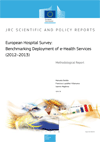 The "European Hospital Survey: Benchmarking deployment of e-Health services (2012–2013)" project gathered information on eHealth adoption and use in acute hospitals in all 28 EU Member States as well as Iceland and Norway (EU28+2). It was carried out on behalf of IPTS by Price Waterhouse Cooper (PwC) Luxembourg in cooperation with Global Data Collection Company (CDCC) which collected the data through a survey. This report prepared by PwC describes and analyses the main descriptive results of the 2012-2013 survey, which is the continuation of the eHealth benchmarking Phase III project carried out in 2010-2011 on behalf of the European Commission.
The "European Hospital Survey: Benchmarking deployment of e-Health services (2012–2013)" project gathered information on eHealth adoption and use in acute hospitals in all 28 EU Member States as well as Iceland and Norway (EU28+2). It was carried out on behalf of IPTS by Price Waterhouse Cooper (PwC) Luxembourg in cooperation with Global Data Collection Company (CDCC) which collected the data through a survey. This report prepared by PwC describes and analyses the main descriptive results of the 2012-2013 survey, which is the continuation of the eHealth benchmarking Phase III project carried out in 2010-2011 on behalf of the European Commission.
The study "European Hospital Survey- Benchmarking Deployment of eHealth services (2012-2013)" is composed of the following reports:
- Methodological Report
- Survey Report (SMART 2012/0036)
- Composite Indicators on eHealth Deployment and on Availability and Use of eHealth Functionalities
- Country Reports for 28 EU Member States, Iceland and Norway
- Synthesis of Outcomes
- Micro Data (xls)
- Micro Data Codification Manual (xls)
Download from eHealthNews.eu Portal's mirror:
- Methodological Report
- Survey Report (SMART 2012/0036)
- Composite Indicators on eHealth Deployment and on Availability and Use of eHealth Functionalities
- Country Reports for 28 EU Member States, Iceland and Norway
- Synthesis of Outcomes